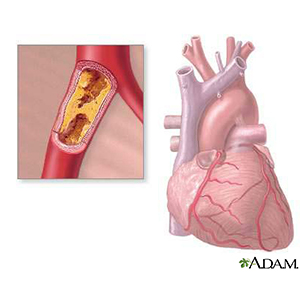WHAT YOU NEED TO KNOW: What is cholesterol? Cholesterol is a waxy, fat-like substance that is made by your body. Cholesterol also comes from the foods you eat. Your body needs this fat to work properly, but high levels of cholesterol can lead to health problems. What are the risks of unhealthy cholesterol levels? Cholesterol can build up in your arteries and form plaque. As plaque builds up, your arteries become narrow, and less blood flows through. When plaque decreases blood flow to your heart, you may have chest pain. If plaque completely blocks an artery that carries blood to your heart, you may have a heart attack. Plaque buildup can also increase your risk of a stroke. 
|
How are unhealthy levels of cholesterol managed? Your healthcare provider will use blood tests to measure your levels of triglycerides, LDL (bad cholesterol), and HDL (good cholesterol) He will ask if you or your family members have other health conditions, such as diabetes, high blood pressure, or thyroid disease. He will also ask if you smoke. He will recommend treatments to help to decrease your risk of heart disease, heart attack, and stroke. Treatment includes changes to the foods you eat and lifestyle changes. You may also need medicine to decrease your cholesterol levels. How does food affect my cholesterol levels? - Unhealthy fats increase LDL cholesterol levels in your blood. These fats are found in foods that are high in cholesterol, saturated fat, and trans fat.
- Cholesterol is found in eggs, dairy, and meat.
- Saturated fat is found in butter, cheese, ice cream, whole milk, and coconut oil. Saturated fat is also found in meat, such as sausage, hot dogs, and bologna.
- Trans fat is found in liquid vegetable oils and is used in fried and baked foods. Foods that contain trans fats include chips, crackers, muffins, sweet rolls, microwave popcorn, and cookies.
- Healthy fats, also called unsaturated fats, help lower LDL cholesterol and triglyceride levels.
- Monounsaturated fats are found in foods such as olive oil, canola oil, avocado, nuts, and olives.
- Polyunsaturated fats, such as omega 3 fats, help to decrease triglyceride levels. Omega 3 fats are found in fish, such as salmon, trout, and tuna. They can also be found in plant foods such as flaxseed, walnuts, and soybeans.
What changes can I make to the foods I eat? - Decrease the total amount of fat you eat. Choose lean meats, fat-free or 1% fat milk, and low-fat dairy products, such as yogurt and cheese.
- Replace unhealthy fats with healthy fats. Cook foods in olive oil or canola oil. Choose soft margarines that are low in saturated fat and have little or no trans fat.
- Include fish in your diet. Eat 2 servings of fish each week. One serving is about 4 ounces. Fish is a good source of healthy omega 3 fats. Salmon and canned light tuna are fish with low levels of mercury. Children and pregnant women should not eat fish that have high levels of mercury, such as shark, swordfish, and king mackerel.
- Eat a variety of fruits and vegetables. Include dark-colored fruits and vegetables such as peaches, berries, spinach, and carrots. They are good sources of vitamins that are important for good health
- Eat more fiber. Choose whole grain, high-fiber foods to decrease LDL cholesterol. Good choices include legumes, oats, apples, and brussel sprouts. Oranges, carrots, and whole-wheat breads or cereals are also good choices.
What lifestyle changes can I make to improve my cholesterol levels? - Maintain a healthy weight. Ask your healthcare provider how much you should weigh. Ask him to help you create a weight loss plan if you are overweight. Weight loss can decrease your total cholesterol and triglyceride levels. Decrease the amount of calories you eat by 500 calories a day to help you lose weight. You can decrease calories by eating smaller portions for each meal and eating fewer high-calorie foods.
- Exercise regularly to lower your cholesterol levels and maintain a healthy weight. Get 30 minutes or more of moderate exercise 5 days each week. Include muscle strengthening activities 2 days each week, such as push-ups, sit-ups, and lifting weights. To lose weight, get at least 60 minutes of exercise on most days of the week. Work with your healthcare provider to plan the best exercise program for you.
|